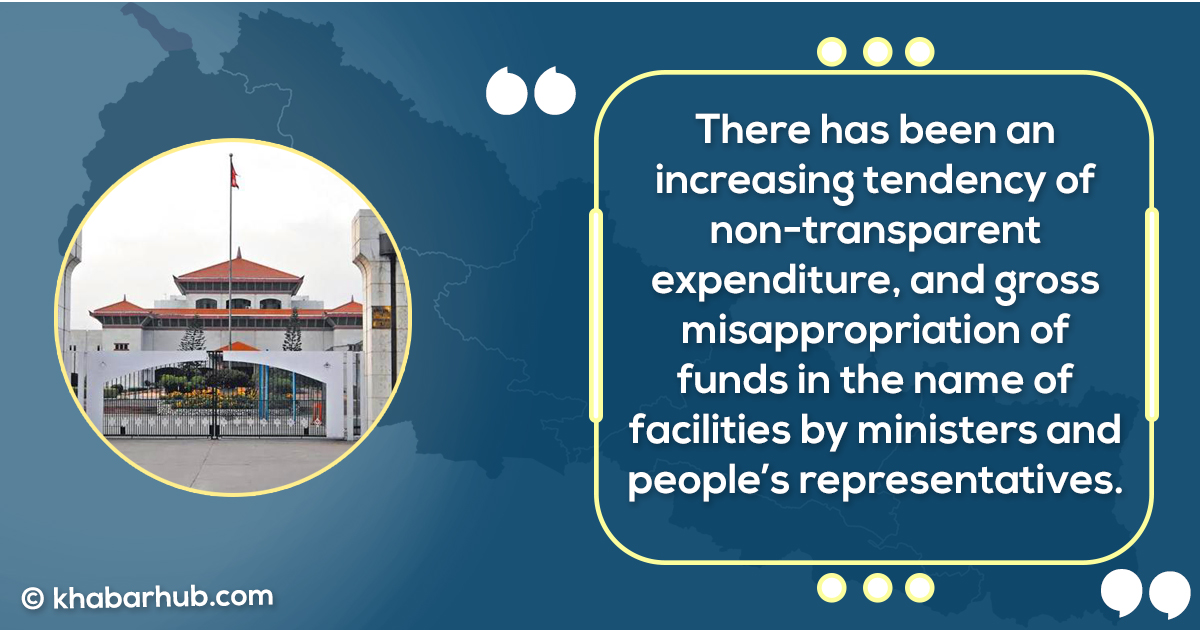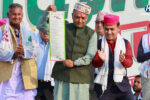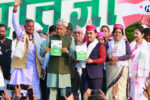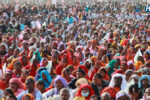KATHMANDU: Nepal’s transition from a unitary to a federal system of governance has been quite daunting despite the fact that the central government has formulated and approved several related laws.
The Constitution of Nepal has entrusted the executive, legislative, and the judicial functions to all three tiers of the government — the federal government, state government and the local government — under shared and exclusive jurisdictions.
However, substantial overlaps and ambiguities remain among the three tiers of the government, including seven provinces.
Provisions of intergovernmental revenue and fiscal transfers to compensate for vertical fiscal imbalances have taken place. However, lapses occur in the implementation of a well-functioning fiscal federal framework.
Nepal now has 753 local governments, seven provincial governments, and one central/federal government with the local and provincial governments holding a variety of political, fiscal, and administrative powers.
If the constitutional provisions are to be considered, 35 political, fiscal, and administrative powers are given to the federal government, 21 to provincial governments, and 22 to local governments.
Federalism itself has been deemed as a costly mechanism and the fear of not being able to sustain it ourselves and continually seek funding from international donors to manage provinces has been an issue of ignominy for the Government of Nepal.
Likewise, there are 25 concurrent powers between federal and provincial governments, whereas 15 are shared between federal, provincial, and local governments.
Nepal’s districts have been increased to 77 from the previous 75 with six metropolis, 11 sub metropolis, 276 municipalities and 460 rural municipalities.
A total of 6,743 wards have been constituted under these 753 local levels. Each ward consists of one ward chair along with 4 ward members.
However, although the Constitution guarantees federalism, it remains challenging when it comes to its implementation – particularly on the issue of power-sharing and other fiscal activities because of which there has been an increasing vexation among the common populace.
It is certain as people believe that federalism does not suit for a landlocked country like Nepal.
The country, which previously enjoyed a unitary system of government, has been experimenting with a three-tier government with all the seven provincial governments not very satisfied with the decentralization of power and budget.
There has been evidence of conflict between the federal government and the provincial governments on various issues, including power, budget, among others.
Federalism has brought a lot of concerns saying that it has been exorbitantly costly for Nepal. In fact, the Constitution of Nepal clearly has mentioned that the provinces and the local level entities can impose a tax on subjects and collect revenue within their fiscal jurisdiction.
It should also be noted that the local-level representatives have mired in the culture of greed of receiving allowances, and perks, which has been widely dubbed as a gesture of political vanity.
Moreover, ministers, former ministers, and parliamentarians at the federal level, too, enjoy the facilities of their staffers. As a result, the state is compelled to bear the financial burden. This budget meanwhile could be used somewhere in some productive sectors.
The Constitution has also mentioned that the Government of Nepal shall make necessary arrangements to equitably distribute the revenue generated by it from its resources between the central, provincial and the local level bodies.
Now, the question is: Can the federal government bear all the expenses, including the salary, allowances, and other perks and facilities given right from the President, Vice President, Prime Minister, Ministers, Chief Ministers, bureaucrats, and right down to the local level authorities?
Federalism itself has been deemed as a costly mechanism and the fear of not being able to sustain it ourselves and continually seek funding from international donors to manage provinces has been an issue of ignominy for the Government of Nepal.
The new structure has, unfortunately, increased a significant number of parliamentarians, ministries, ministers and bureaucrats among others, which has become difficult for the state to manage the funds as a federal system is always costly as well as complex.
If the figures made public by the Ministry of Finance is to be considered, Nepal needs around $8 to $ 11 billion in the next five years for the implementation of federalism. Moreover, the financial burden acts as an impediment for fiscal federalism, forget about the salary and other facilities of the ministers, bureaucrats, and people’s representatives.
It may be noted that Nepal’s first federal budget of 2018-19 had allocated Rs845 billion under the recurrent expenditure and Rs314.28 billion for capital expenditure.
In the second federal budget of 2019-2020, the government had allocated Rs957 billion as recurrent budget and Rs408 billion capital expenditure. And, considering the gap between the administrative expenses and the budget for the development projects, it clearly reflects the country’s financial vulnerability.
The administrative costs have significantly increased of late since as many as 49 new ministries have been established in all the seven provinces, and 55 ministers have been appointed to the respective ministries, including the Chief Ministers.
On average, every ministry has an average of 10 staffers. Likewise, the provincial assembly comprises of 330 members from 330 constituencies and 220 members through proportional representation. For a country like Nepal, having this amount of people in power is a burden.
Now consider this: Each minister or a lawmaker are provided with quite a significant number of staffers (security guards, secretaries, personal assistants, advisors, driver, and office assistants, among others).
However, the case is still the same as the local resources are minimally utilized with no proper action plan. As a result, we can merely see any outstanding development work taking place in any province.
Likewise, they receive allowances on various topics such as accommodation, communication, transportation, monthly allowances, etc. adding burden to the already sickening federalism.
Moreover, ministers, former ministers, and parliamentarians at the federal level, too, enjoy the facilities of their staffers. As a result, the state is compelled to bear the financial burden. This budget meanwhile could be used somewhere in some productive sectors.
Analyzing the average monthly salary of ministers and parliamentarians at the federal level, it comes to a total of NRs. 2 crores 20 lakhs (Rs 22,054,208).
Likewise, the average monthly salary of the federal parliamentarians alone stands at NRs 3 crore 24 lakhs (Rs 32,450,000).
Similarly, the average monthly salary of the ministers of the federal government totals at NRs 34 lakhs 78 thousand (NRS. 3,478,750).
Likewise, the local level consists of a total of 6,743 wards, which are formed under the 753 local levels. Each ward consists of one ward chairperson along with 4 ward members.
The average monthly salary of these representatives comes to NRs 31 crore and 45 lakhs (NRS. 314,565,000). This amount is the average total salary of mayors, deputy mayors, ward chairperson and ward members.
Apart from these, the state has to bear the salary and allowances of the bureaucrats and the staffers working solely for ministers and parliamentarians of the provincial levels.
All these indicate how federalism is becoming a burden with the increased financial load.
The Office of the Auditor-General has time and again asked the authorities concerned to payback the allowances taken illegally.
Besides, looking at a country’s budget expenditure, it is separated into capital expenditure and recurrent expenditure.
While the capital expenditure is used for development works or infrastructure such as building schools or hospitals and to acquire, upgrade, and maintain physical assets such as property, plants, buildings, technology, or equipment, recurrent expenditure is all other payments such as wages, salaries and allowances, purchases of goods and services and consumption of fixed capital (depreciation).
Generally, the recurrent expenditure is spent more than the capital expenditure which means, the budget is being spent the least on development activities.
Even more importantly, what has to be taken into consideration is that as many as 6,000 complaints were filed at the Commission for the Investigation of Abuse of Authority (CIAA) against local levels in one fiscal year, which is an indication of the increasing tendency of non-transparent expenditure, and gross misappropriation of funds.
After the implementation of federalism, citizens had great expectations for this trend to stop. However, the case is still the same as the local resources are minimally utilized with no proper action plan. As a result, we can merely see any outstanding development work taking place in any province.
The bottom line is: The ministers, parliamentarians, mayors and other elected bodies are appointed by the people for the people.
Their sole motive must be to work for people and the country’s welfare and development. Unfortunately, the case here is different.
The reality is that the elected representatives are living a lavish life out of the state money. The salary of these individuals might seem moderate but the facilities and staffers that they have been enjoying cost a lot to the state.
In order to control and break this trend, it is high time that the voters became conscious enough to raise our voice against such a financial burden.
Checking the monthly accounts of the government is equally important for the people.
Even more importantly, what has to be taken into consideration is that as many as 6,000 complaints were filed at the Commission for the Investigation of Abuse of Authority (CIAA) against local levels in one fiscal year, which is an indication of the increasing tendency of non-transparent expenditure, and gross misappropriation of funds.
Finally, the question is: Is it fair to provide people’s representatives with such facilities while the country is struggling to run the government?









Comment